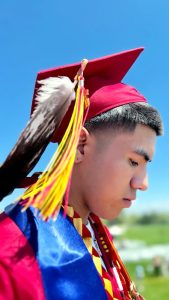Native students often wear regalia or related items for the same reasons that some students wear an honor cord or stole to graduation—in recognition of their academic achievement. For many Native students and their families, preparing for graduation includes determining if their school graduation policies honor the right of Indigenous people to wear traditional clothing or religious and cultural items to their graduation ceremony.

Class of 2025 high school students who will graduate this May, may need to build a bridge of understanding
Many states and schools now have policies to ensure Native students receive the same respect and regard as students allowed to wear other symbols of religious and academic achievement. However, some school district policies require students to request dress code accommodations well in advance of the graduation ceremony.
Students, families, allies, and educators sometimes must help school officials grasp the significance of Native regalia created for graduation. Once school administrators understand the religious, cultural, and academic significance of Indigenous cultural items, they are more likely to respect students’ right to wear them. For resources to help start a conversation, visit: https://narf.org/resources/graduation/
If they haven’t already, Native students and their families should review school policies and request any dress code accommodations as early as possible. Starting early gives the family and student time to build a bridge of understanding with school officials who may or may not have an inclusive policy to guide them.
NARF looks forward to you and your loved ones celebrating your great accomplishment while proudly practicing your Native religious and cultural traditions at graduation.
Will you support them?

Sadly, Native students from across the country contact the Native American Rights Fund (NARF) for assistance because their schools denied requests to wear traditional items at graduation. Schools that insist on uniformity of dress at any cost force Native students into the position of having to choose between being included in the celebration or following religious and cultural traditions.
Without the help of allies, Native students and their families bear the burden of making school district policies more inclusive. Be an ally!
Proactively share the link to this post with the principal of your local public high school. Ask if school and district dress code policies affirm the right of Indigenous students to practice their religious and cultural traditions.
If the school does not have a policy of welcoming Native students to participate in the graduation ceremony while donning their traditional attire, please let them know they can find information to help update district policies at: https://www.narf.org/cases/graduation/
Thank you for your advocacy: it could make all the difference for a Native student in this year’s graduating class and in years to come, too.
More blog posts

